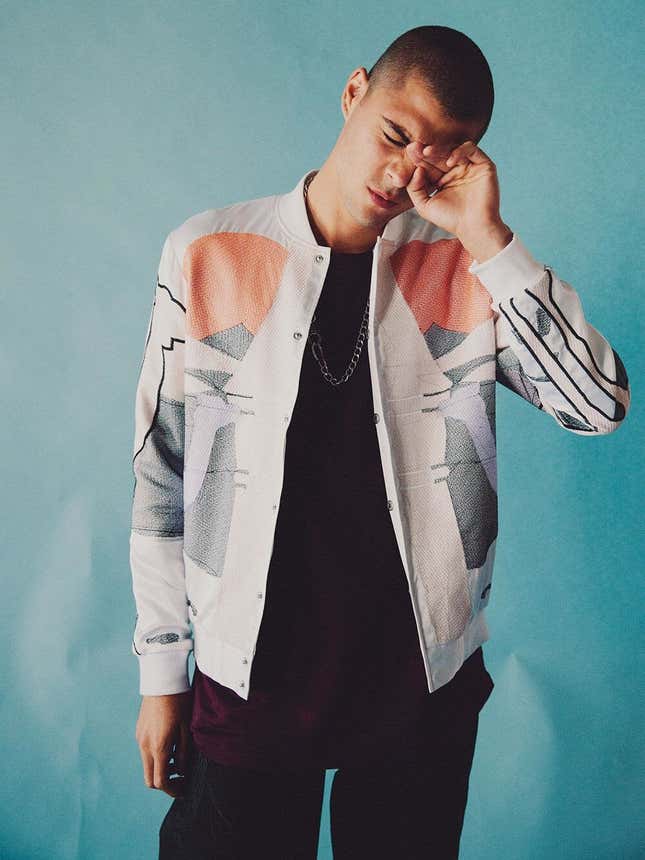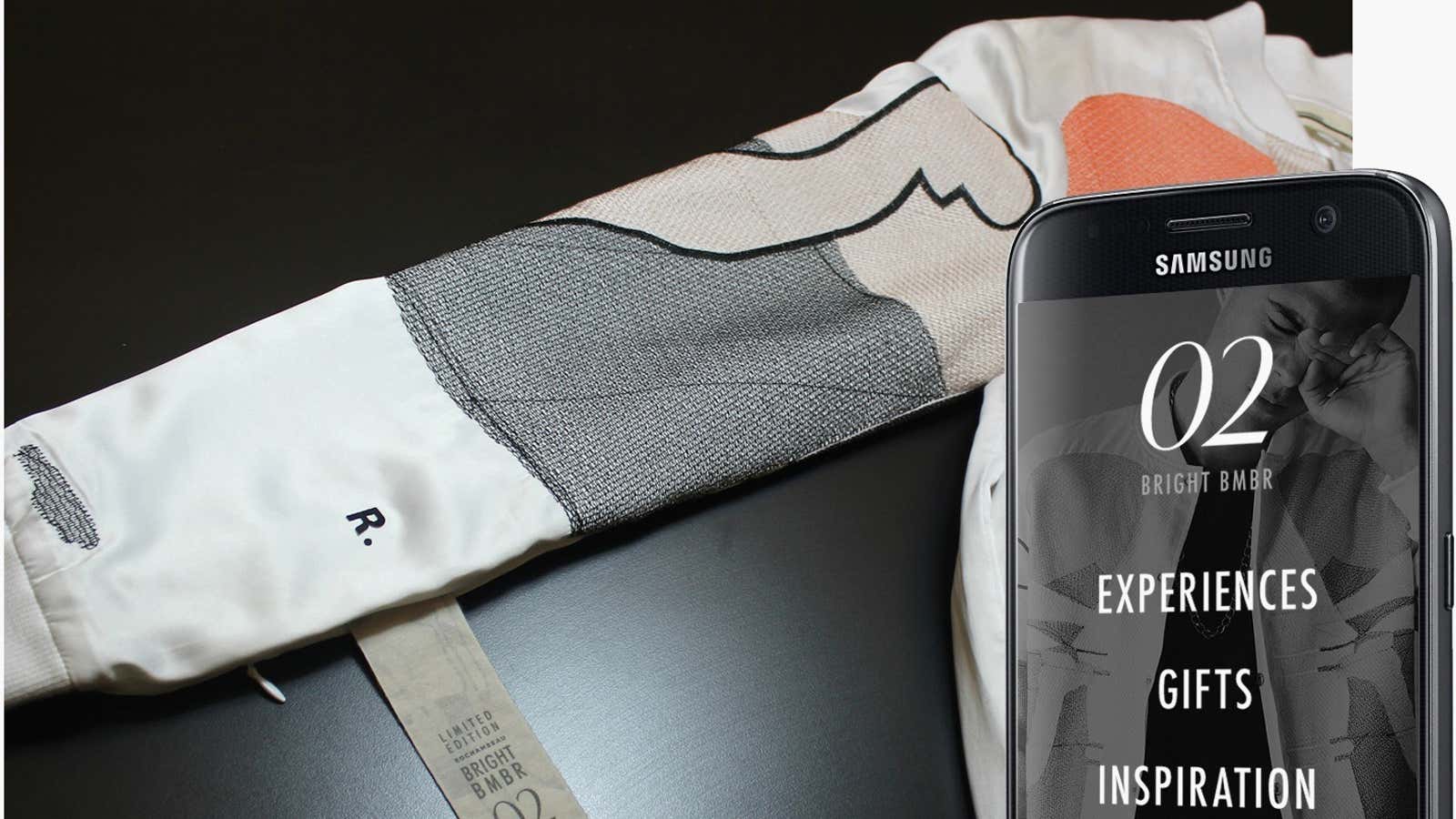Imagine you’ve just purchased a new jacket from your favorite brand. You put it on for the first time, and scan a tag embedded in the sleeve with your phone. A menu of options pops up.
You can find information about the jacket’s design, how the brand selected only sustainable materials, and details on the exact factory where the product was made. You plug in your earphones and listen to a playlist the brand put together.
Later in the week, you head to a party that the label is throwing to celebrate its latest collection, and the bouncer scans your RFID, (like the radio-frequency identification tags in key fobs or prepaid toll devices), which functions as your ticket. Somebody spills a drink on your new jacket—of course—so the next day, you throw it in the wash. It automatically communicates with your washing machine to select the right laundry setting.
This is the futuristic vision laid out by Avery Dennison, which manufactures the care labels in much of your clothing, but also develops retail and information solutions for brands. Internet-connected clothes with these capabilities are not far off, says Rana Sidahmed, the company’s global creative director. ”I think the future is here,” she says. But, she adds, “it’s kind of loosely dispersed, like William Gibson said.” (Sidahmed was referring to the quote widely attributed to the influential sci-fi author: “The future is already here—it’s just not very evenly distributed.”)

And indeed, internet-connected clothes are already being made, but only in scattered experiments so far. At the Decoded Fashion Summit on Nov. 2, Avery Dennison unveiled a smart bomber jacket, called the Bright BMBR, that it created with the fashion label Rochambeau and with EVRYTHNG, a London internet-of-things startup. The jacket has a NFC chip (a near-field communication chip like what your phone uses to pay for something in a store) and personalized QR code, allowing it to act like a VIP pass to different events around New York, including a tasting menu for two at tapas spot Toro, a personal tour of New Release art gallery, and entry to some exclusive clubs. It also unlocks gifts at certain locations, including a piece of signed artwork inspired by the jacket. And it will serve as a ticket to Rochambeau’s next runway show at New York Fashion Week.
The Bright BMBR will go on sale in December for $630, in a very limited run—just 15 are being released. But it’s only the beginning. Avery Dennison and EVRYTHNG announced a plan earlier this year to connect 10 billion pieces of clothing and accessories to the internet. Like the Rochambeau jacket, they would all run on Avery Dennison’s and EVRYTHNG’s smart-products platform, Janela.
Much has been made of wearable technology—wristbands, glasses, and other such devices—but as the apparel industry prepares for a connected tomorrow, it’s the clothing itself that designers are hooking up to the internet. At a Nov. 10 conference by the trend-forecasting firm WGSN, Andrea Bell, its director of insight on consumer behavior and commerce, predicted that by 2030 wearables will be obsolete. “We won’t need wearables,” she said, “It will just be in our clothes.”
Avery Dennison is in a good position to push that vision forward. The company already provides labels, care tags, and other items to a number of major apparel and footwear brands, including Nike, Under Armour, and Hugo Boss. And it furnishes RFID tags to a number of companies, including Marks and Spencer, for inventory tracking. The big task ahead is to combine these functions to make RFID tags work directly for customers.
A few brands are already putting RFID to work in customer-facing experiences. As with many things digital in fashion, Burberry is a pioneer. In 2012, it opened its tech-enabled Regent Street store in London, which features interactive mirrors that react to garments with RFID tags sewn in. A guest who tries on a trench coat and walks up to one of the mirrors, for instance, may be met with a video of how the coat was made, or a clip from the runway show it appeared in.
At one of Rebecca Minkoff’s “connected stores,” the first of which opened in 2014, RFID tags in the garments make the fitting rooms interactive. When a guest brings a garment in, the mirror pulls up a product screen that lets the customer find the garment in other sizes or colors, or see the item styled with different looks.
What Avery Dennison is trying to do is bring these experiences outside the store and expand their possibilities. Sidahmed says the company has no exact roadmap for hitting 10 billion connected items, but the project is underway. ”The first collaboration is here with Rochambeau,” she says. “Now the conversation is starting.”
The endeavor has obstacles to overcome, however. For one thing, RFID tags aren’t something you can just throw in the laundry and expect to keep working. Washable versions do exist, but Sidahmed admits they’re too expensive at the moment to be widely used. For now, they have to be removable so you can launder the garment, though Sidahmed says companies are working on the problem.
Beyond that, many of the possible RFID-enabled experiences that internet-connected clothes promise only work if the RFID tag is communicating with something that understands it. Avery Dennison has worked with Sarah Angold, a UK-based jewelry designer, on necklaces that can communicate with an interactive mirror, allowing the wearer to order a different color for example. But most mirrors, like most washing machines and other items, aren’t yet designed to be interactive.
Still, use of RFID is growing rapidly, and Sidahmed believes manufacturers understand that and will respond accordingly. Ultimately it would give the clothes another dimension, which was part of the appeal for Rochambeau co-founder Laurence Chandler. ”These days people want experiences more than just objects,” he told Forbes.
If the technology were to take off, those experiences would add another layer of branding to every garment, and that layer could be just about anything a designer could imagine.
An earlier version of this article spelled the name of jewelry designer Sarah Angold as Sarah Engle and internet-of-things startup EVRYTHNG as EVRTHING.




